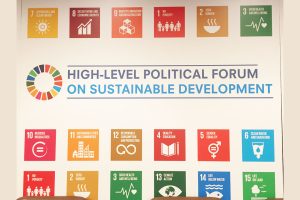By UN Department of Economic and Social Affairs (DESA)
Halfway to the 2030 deadline, the SDGs are not on track to be achieved. Instead, the world is on a course to leave many behind – millions living in poverty and hunger, women and girls with unequal opportunities, communities facing climate disaster and families fleeing conflict. The recently released ‘Report of the Secretary-General on Progress towards the Sustainable Development Goals’ is a wake-up call to the world to redouble our efforts to achieve the SDGs. The UN Secretary-General calls for a “Rescue Plan for People and Planet,” one that secures the rights and well-being of everyone while safeguarding our environment.
This puts complex demands on public institutions, to manage trade-offs, to balance long- and short-term needs, or to recognize and respond to feedback loops. The seven-year push toward 2030 requires strengthening national and sub-national capacity and accountability of public institutions.
SDG delivery must be a central focus for national planning, oversight mechanisms, and domestic budgets. Legislative action and resource allocation need to have tangible economic, social, and environmental impacts. We will fall short on commitments unless the SDGs become the core business of Presidents and Prime Ministers, Parliaments, and the private sector.
Major investment is needed to strengthen public sector capacity and build appropriate digital infrastructure. Public institutions and public servants must be equipped to monitor and adjust policy implementation – including through budget allocation – to maximize benefits and capitalize on synergies while having a clearer picture of trade-offs. They also need to be able to work across sectors contributing to a whole-of-government approach to the SDGs. The ability of institutions to steer and leverage digital technologies, in an inclusive and equitable manner, is also key, as is a capacity to work in unison with the private sector to advance the SDGs.
Local and sub-national governments must be empowered to bring SDG implementation to the ground level. 65% of SDG targets are linked to the work and mandates of these institutions. Voluntary local reviews (VLRs) of SDG progress have contributed to data innovation, planning and policy coherence, project development, and financing efforts. But the financial, human, and technical resources of local and regional governments remain limited, hindering their capacities to deliver basic services and drive development at the local level.
An effective regulatory framework is needed to align the private sector with sustainable development objectives. Business leaders increasingly acknowledge sustainability as a factor for long-term success. But when businesses make commitments to sustainability and climate action, there must be a way to hold them accountable. Policies and regulations can facilitate long-term decision making by properly pricing negative externalities and phasing out harmful subsidies. We should also improve the transparency and credibility of sustainability labels and ratings to eliminate rampant green-washing and SDG-washing.
A fresh push is needed to reap the data dividend. Access to timely and high-quality, disaggregated data can improve the effectiveness of development spending. Yet many countries lack the resources and capacities needed to respond to data demands, meaning there are significant gaps in SDG indicator geographic coverage, timeliness, and disaggregation. Governments must increase domestic financing for data and statistics. Donors can help by increasing the share of official development assistance (ODA) going to support data efforts. New data sources and innovative approaches – from geospatial information and remote sensing, to artificial intelligence (AI), machine learning, and citizen-generated data – all represent new opportunities, but are not without their own risks and challenges. Strong data governance, data literacy, and data protection policies are essential.
Finally, strengthening civic space and public engagement in policymaking can take SDG monitoring and review to the next level. Overall, countries have improved the preparation of the voluntary national reviews of SDG progress (VNRs), engaging stakeholders more systematically and combining multiple tools of analysis. But with the SDGs so far off track, it is time to shift attention to strengthening national accountability. This calls for a systematic inclusion of the Goals in national oversight systems, more independent evaluations of SDG implementation, greater involvement of scientists in monitoring and review, and a fundamental rethink of the VNR process. Robust, well-funded public institutions are an essential ingredient for achieving the SDGs. Now is the time to invest in them.
* * *
This article is the third in a five-part series by the UN Department of Economic and Social Affairs (DESA), published in partnership with IISD. Focusing on the SDG Progress Report special edition themed, ‘Towards a Rescue Plan for People and Planet,’ the series puts forth areas of collective action necessary to turn things around so we can deliver on the promise of the 2030 Agenda.


